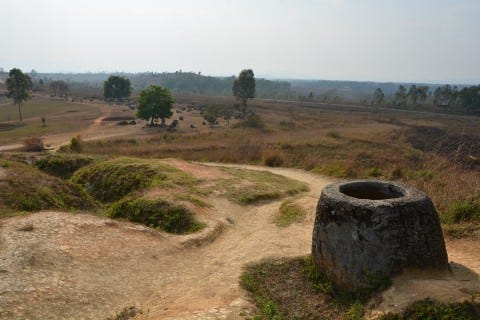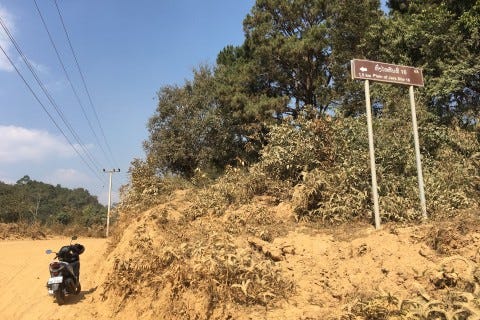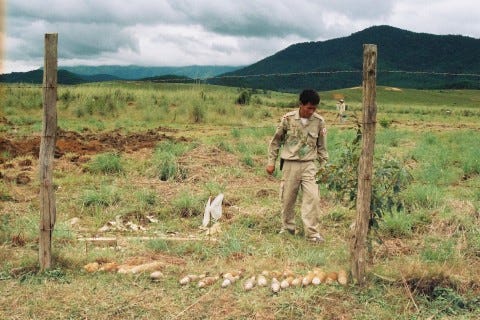Travelfish newsletter Issue 319 : Phonsavan + Vexed by visas + Lombok Earthquake
Hi all,
This week was marked by another tragic earthquake in Lombok, Indonesia, with the death toll so far at around the 100 mark, though it is expected to rise considerably. Much of the international media coverage has focused on the plight of foreign tourists on the Gili islands, including scenes of near bedlam at beach evacuations yesterday. The islands did see damage due to the quake, including loss of electricity, and being so low slung, they are at significant risk of a tsunami if there is another quake.
Importantly however, other parts of mainland Lombok have also seen damage and deaths, including a mosque on the island that collapsed apparently while people were worshipping within. Indonesians who are facing pressing needs other than a disrupted holiday also require assistance. If you would like to make a donation to help those in need, the Indonesian Red Cross is accepting donations (though via bank transfer, not by an easy online manner unfortunately).
Here’s to hoping we’ve seen the last of these Lombok earthquakes.
On the site, we have fully updated our coverage of Phonsavan in northern Laos. Phonsavan is best known as the access point for the famous Plain of Jars, but a visit can also deliver some understanding of what Laos has suffered through right up to the current day as a result of the conflict in neighbouring Vietnam. Sobering stuff.
Regular Travelfish readers will know we’re big fans of slow travel, and so you’ll probably not be surprised by our newly revised Bangkok-to-islands itinerary. Why do an overnight bus or train when you can spend three weeks doing the same miles?
Stuart’s Soapbox is on being vexed by visas, and in a somewhat related note he’s taking an unplanned trip to southern Vietnam this week. Follow him on Instagram if you want your feed filled with pho pics from this Friday onwards.
No book review this week—instead we’ll point you to this delightful NYT piece on the delights of kids reading (by the author of The Sympathizer and The Refugees, which we have already reviewed).
Good travels
Stuart, Sam and the Travelfish crew
PS Thanks for the suggestions on a name for the Thai Shinkansen. We were especially taken with the “Tom Yam Go”, the “Super–ngu” (ngu is snake in Thai), the “Pad Thai Express” and, best of all, the “Super som tam”. Plenty for the Thai train authorities to chew on!
Support Travelfish!
If you'd like to chip in (if you haven’t already) for using the site, we'd love you to sign up for a year-long subscription for just A$35. See more here.

Soapbox
Vexed by visas
You’ve probably seen The Office (either the UK or US version), a cringeworthy series centred on an office I watched through parted fingers. I’ve often thought a similar show could be made sending up an immigration office—after all, who hasn’t cringed in the immigration queue?
This week a video emerged of a UK citizen totally losing her cool with a couple of immigration officers at Bali’s international airport. After an overstay of some One Hundred and Sixty Days (yes, 160, not 16) she ended up not just needing to pay an enormous fine but also detained, probably in part because, in the heat of the moment, amid a stream of abuse directed at the officers, she slapped one of them.
That’s always a no no.
The full background story to what happened is yet to see the light of day, but if I had to guess, I would say the woman thought she could pay the fine and then leave, and did not realise she was going to be detained regardless. In the video, she goes on at length about “missing her flight” but, well, who knows. I imagine once a cooler head prevails she’ll be mortified by the whole thing.
Visa rules can often be deliberately vague, or haphazardly enforced, leaving plenty of wiggle room for the officer who wants to perhaps deny entry (or, as in the case above, exit) to a traveller. Many countries have an “onwards flight” requirement, which is rarely asked for, except in cases where the officer is looking for a reason not to let the person in.
At the end of the day, the power resides with the officer you’re standing in front of. While interpreting complex, open–to–interpretation visa regulations (especially those for longer stays) can be a frustrating experience (take our word for it!), they are what they are. It rests with the traveller to be abreast of what they should be doing to be legal.
As illustrated by the above case, losing your cool rarely pays dividends.
And remember, when you get stamped in, always check the dates stamped in your passport. If you have a question, ask it. Don’t overstay. Lastly: Never, ever slap an officer—or anyone else for that matter!
Good travels,
Stuart
Premium members only:
Book a round the world with roundtheworldflights.com (must travel from the UK via Asia, Australia, New Zealand AND the Americas) and get £30pp off your trip. Offer valid for departures to December 2018.
Log in to the Member Centre on Travelfish now for your coupon code and
start designing your own round the world trip »
Featured
Phonsavan
The capital of Laos’ Xieng Khouang province, Phonsavan itself is a bit a nondescript place, but as the launching point for exploring the fascinating Plain of Jars, Phonsavan makes for an important stop on any in-depth trip to Laos.

As a destination, it delivers on two primary counts—as a base for exploring the Plain of Jars, but also as a means to gather a deeper understanding of what happened to Laos during the Vietnam War period, and how, the aftermath of those years continues to haunt the region.
The jars, scattered across a series of sites around the provincial capital can be visited independently or on an organised tour and while a visit to just a single site may be enough for a quick look, for the traveller with more time, there are a number of other jar sites worth exploring.

As with many destinations in Laos, half the attraction is the getting there bit, and on this count, Xieng Khouang province does not disappoint. Rolling hills, interspersed with grassy fields, forest and paddie, separate small centres of population, including an old capital which was almost bombed out of existence. Everywhere you travel, evidence of the war period is evident—be it fields of craters, a Russian–supplied tank basking by the side of the road, shell cases everywhere—from village walls to holding up chicken coops.
Visit a village where war scrap is recreated into tourist trinkets (bomb casing bottle opener anyone?), along with spoons and other more useful devices not designed to kill or maim. In Phonsavan, visit two centres involved in the ongoing de-mining and working to assist those maimed and support families who have lost members—this is the slow bleeding aftermath of a long-forgotten by many war and a visit will help to enlighten. Donations are of course welcome and encouraged.

Just a day of travel from either Vientiane or Luang Prabang will bring you here and so for those with a little extra time, a visit to Phonsavan and the Plain of Jars is well worth considering—for both the history, the countryside and the chance to learn something more about the country you are travelling in. Don’t worry, there is no shortage of decent places to stay.
Read more about Phonsavan here.
Travelfish partners
When we travel we always use TunnelBear VPN to secure our browsing. This reduces the risk from dodgy WiFi networks and idiotic ISPs who inject ads into our browsers. Use the internet safely with TunnelBear. TunnelBear offer a free 7-day trial or use it selectively and enjoy 500meg of data per month for free.
News from the region
CAMBODIA I: The death of democracy in Cambodia
“Democracy in that country has long been a ritual rather than a reality, but this campaign exposed the claims of representative government as empty.”
CAMBODIA II: The future of Cambodia looks increasingly Chinese
“But critics claim that in ceding territory and other long-term economic concessions to China, Hun Sen’s government is effectively enabling China’s de facto 'colonization' of his country as it yields more and more to Beijing’s ambitions and demands.”
INDONESIA I: Earthquake: Rescuers search for survivors, tourists flee holiday islands
“The National Disaster Mitigation Agency (BNPB) said it expected the death toll to rise once the rubble of more than 13,000 houses was cleared away after two powerful quakes in a week. Power and communications were severed in some areas, hampering the search for missing people, with landslides and a collapsed bridge blocking access to areas around the epicentre in the north.”
INDONESIA II: Bodies keep shrinking on this island, and scientists aren't sure why
“But at some point after they came to Flores, they became very short — as did Homo floresiensis before them. And they’re not the only mammals to have shrunk.”
INDONESIA III: Sydney woman 'on honeymoon' detained in Bali
Best Honeymoon ever. Not. Ties in with this week’s soapbox.
LAOS I: News of Laos dam failure didn’t reach them, but the water did
“But it is increasingly dotted with dams. More than 60 have been built on the basin’s rivers in the past 25 years, altering water and sediment flows and depleting fish stocks. About 50 more are planned or under construction.”
LAOS II: Laos dam collapse survivors warned of unexploded bombs dislodged during floods
“Mr Redfern says the added danger is that areas deemed safe have often been cleared only to a depth of about 35-40 centimetres below the surface, meaning heavy flooding can easily uncover mines deeper underground and bring them to the surface.” Awful.
LAOS III: Laos dam collapse death toll rises to 31, scores still missing
“Laos Minister of Energy and Mines Khammany Inthirath has said the poor construction may have contributed to the accident and the government would launch an official investigation into the cause.”
SOUTHEAST ASIA: Illegal tiger trade fed by ‘tiger farms’, new evidence reveals
“The bones of captive tigers are often used for wine or medicinal paste; the skin is used for furniture upholstery and decor such as rugs or wall hangings, and the teeth may be set in gold and turned into jewelry. Being able to wear, display, or consume tiger products is a coveted status symbol among some Chinese and Vietnamese.”
THAILAND I: Eleven dams reaching their storage limit
“To cope with these problems, the government has ordered the reservoirs and dams to be drained at a faster rate so they can receive more rainfall that is expected to pound the northeastern and western regions of the country until Saturday. ”
THAILAND II: Thailand’s junta invents a new coup d’etat
“However, what is at work at the moment is a new model, a 'permanent coup' designed to span more than 20 years, elections or no elections.”
THAILAND III: 'It's a shocking idea': outcry over Bangkok street vendor ban
“The BMA’s controversial edict keeps Khaosan Road empty in the daytime – in stark contrast to the surrounding streets, which have vendors every few metres – and restrict all street sellers to the evenings.”
THAILAND IV: In tourist spots, a hidden world of male sex slavery
“ 'Why does this not shock and enrage people as much as it does when it's girls?' said Ms Russell, whose drop-in centre is for boys in Chiang Mai's sex industry.”
THAILAND V: Locals brace for brutal floods
“Floods have become an accepted part of life in Phetchaburi after having pounded the province for the past three years. In November, eight districts and 30,000 families were affected, with 12,000 rai of farmland inundated and crops destroyed.”
Travel writing
OVERTOURISM: What can tourists do to alleviate overcrowding?
“An obvious way we can reduce our impact upon the places we visit is to take fewer short trips. Stay longer in one location and really get to know it, rather than opting for more short term, shallow experiences.”
SOUTHEAST ASIA: Southeast Asia Dispatches
“A fortnightly podcast bringing you reports, interviews and perspectives from New Naratif’s network around Southeast Asia.” A new podcast series from the smart cookies at New Naratif.
THAILAND: Isaan food in Bangkok
“These mouth-watering Isaan restaurants in Bangkok have a whole lot more to offer than grilled snakes and fermented fish.”
TRAVELLERS: Digital nomads are not the future
TRAVEL GUIDES: Before Lonely Planet there was BIT guides
“For none of this work did it ever receive any financial support from government authorities nor did it want such strings-attached grants.”
TRAVEL TECH: As Google Maps renames neighbourhoods, residents fume
“ 'I shouldn’t be making a mistake and 20 years later people are having to live with it,' Mr Mullen said. ” Really interesting story about how mistakes in Google Maps become facts.
Interesting site
World Nomads Podcasts
Better known as a travel insurance company, World Nomads’ podcasts are a great added extra for the listener who wants to learn something more about the world we live in.
Travel shot

The demining goes on and on and on. This photo is from 2004. Photo: Caroline Gaylard
Till next time

That’s it from us for now. As usual, enjoy the site’s new additions and drop us a line if there’s something in particular you’d like us to cover in Southeast Asia.
Travel light!
Stuart, Sam & the Travelfish team
You're receiving the Travelfish newsletter because you signed up at Travelfish.org.
